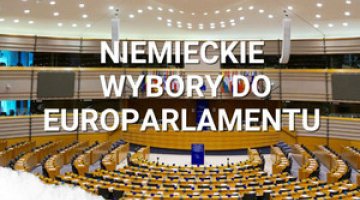Analyses
The elections to the regional parliaments as a measure of changes on the political scene in Germany
On 27 March elections for the parliaments of two Germany's federal states were held; in Baden-Wurttemberg and Rhineland-Palatinate. The Green party won a landslide victory and it will co-establish the regional government in these two federal states. The liberal FDP sustained the largest defeat in the elections as it barely crossed the threshold in Baden-Wurttemberg and did not enter the regional parliament in Rhineland-Palatinate. The FDP’s poor results also constitute a failure for the CDU which, despite a relatively small loss of the vote compared to the election of 2006, is not able to form a coalition and has lost power in Baden-Wurttemberg after 58 years of rule there.
The results of the state elections testify to a lack of confidence in the policies of the federal government of the Christian Democrats and Liberals and confirms a trend visible in the elections which have been ongoing since the beginning of the year of the two ruling parties in Germany losing votes. The credibility of the coalition partners and Chancellor Angela Merkel has been further undermined by the government's recent controversial decisions and inconsistency in pushing for them. This regards above all the decision about the three month moratorium on the extension of the operation of nuclear power plants and Germany's abstention in the vote for the resolution in response to the situation in Libya in the UN Security Council. These decisions were interpreted as a pre-election tactic by a large section of the public opinion and the media.
The state elections accentuated the changes taking place on the German political scene: an erosion of traditional electorates and the growing attractiveness of the Green party for voters in the political centre. These changes will be important for politics on the federal level, particularly for the future of nuclear energy in Germany.
A shift in power in the state parliaments after the elections
In Baden-Wurttemberg the CDU gained 39% of the vote and remained the most powerful party in the state. Nevertheless, the CDU will not be able to form a government as its traditional coalition partner FDP obtained only 5.3% of the vote. The new government will be established by the Green party (24.2%) and the SPD (23.1%).
The regional election in Rhineland-Palatinate was won by the SPD (35.7%) which has been in power in this state since 1991. After five years of ruling independently in this federal state, the SPD will be forced to build a coalition with the Green party which gained 15.4% of the vote. In spite of an insignificant loss of support to the Social Democrats, the CDU (35.2%) will remain in opposition. The FDP obtained merely 4.2% and for the first time in 28 years did not enter the state parliament of Rhineland-Palatinate.
Unprecedented success for the Green party
The exceptionally good result for the Green party increases its role as an equal coalition partner for the mass parties such as the SPD and the CDU. In Baden-Wurttemberg it will be the Green party that will be in charge of forming the regional government and the SPD will play the role so far reserved for the Green party – the smaller coalition partner. The first Green state prime minister in Germany will be Winfried Kretschmann, the leader of the party group in the federal parliament. The Green party’s victory also increases its importance in the context of the Bundestag election in 2013. The Greens are becoming an attractive coalition partner not only for the SPD but also for the Christian Democrats which so far have been rather sceptical of cooperation with the Green party on the federal level. Before the federal election in 2013 the Greens will become more actively involved in debates over general issues in Germany, not only those focused on nuclear energy. They are quite likely to be pushing for increasing taxes for the richest, increasing the protection of personal data and a reduction in CO2 emissions by more than 40% compared to the level of 1990 by 2020. They put these demands forward before the Bundestag election of 2009. Their opinions will probably be treated more seriously by the remaining parties. The success of the Green party can be attributed to several factors.
Firstly, it is a consequence of disappointment felt by a large segment of voters at the politics of the ruling parties and the SPD. The reason for the good results of the Greens is equally the party’s evolution: from an anti-system group to a party that is approaching the centre of the political scene, it has considerably enlarged its political programme far beyond a traditional struggle for environmental protection and the prevention of the discrimination of minorities.
The present electorate of the Green party is to a large extent composed of liberal, wealthy inhabitants of towns and cities, working in liberal professions and having a green lifestyle. Besides a traditional left-wing electorate, liberal CDU and FDP voters are more and more frequently voting for the Green party. In the Bundestag election of 2009 320,000 CDU voters were recorded to have defected to vote for the Green party, whereas according to a survey conducted in Baden-Wurttemberg on 27 March 2011, 87,000 CDU voters and 61,000 FDP voters cast their vote for the Green party. The victory of the Greens in Baden-Wurttemberg, a wealthy and conservative state traditionally dominated by Christian Democrats, was made possible in part due to the prevalence of the topic of nuclear energy at the last stage of the electoral campaigns (in Baden-Wurttemberg there are four out of the 17 German nuclear power plants). The Greens have skillfully used the potential of protest from the local community against the upgrading of the railway station in Stuttgart (the capital of the state). Violent demonstrations that mobilised thousands of inhabitants of the city against plans to upgrade the railway station and which provoked clashes with the police lasted several months. Protests staged in Baden-Wurttemberg in March 2011 by opponents of nuclear power plants mobilised approximately 60,000 participants.
The consequences of the regional elections for the federal government
The results of the regional elections in Baden-Wuerttemberg and Rhineland-Palatinate will cause internal debates in the parties and personnel reshuffles, both in the CDU and the FDP. Demands will probably arise for Guido Westerwelle to resign from the positions of the leader of the Liberals and Foreign Minister. Also leaders of local FDP groups in the two states will be held accountable - Birgit Hombuger, in charge of the liberal faction in the Bundestag and Rainer Brüderle, the Economy Minister. The loss of power in Baden-Wurttemberg means a further weakening of the coalition partners in the Bundesrat, the chamber of the federal parliament that groups together representatives of the state governments, where Baden-Wurttemberg has six representatives. The predominance of the opposition in the Bundesrat resulting from the composition of the state governments (the CDU/CSU and the FDP will only have 25 out of 69 votes) will enable the opposition to block laws submitted by the ruling parties.
Furthermore, the domination of the opposition in the Bundesrat may affect the future of nuclear energy in Germany. The energy strategy, which has been in effect since autumn 2010 and which allows for the extension of the operation of nuclear reactors by an average of 12 years, has been taken to the Constitutional Court on the grounds of procedural irregularities during the legislative process. If the Constitutional Court is favourable to the complaint, which is quite likely to be, the law will have to be voted on in the Bundesrat. With the present balance of power the Bundesrat will reject the law. Consequently, if the government does not find a middle-ground solution likely to be accepted by the opposition, the law of 2002 which stipulates that nuclear reactors should be extinguished by approximately 2020 will come into effect. The German energy industry will therefore become more dependent on gas and it will also be necessary to construct new coal-powered plants and to increase the share of green technologies in Germany's energy balance, which will be expensive. It can equally be expected that larger pressure will be put on Poland so that it modifies its plans of building a nuclear power plant and even that measures aimed at hindering this construction will be taken on the European level.
Appendix
The results of the regional elections in Baden-Wurttemberg and Rhineland-Palatinate in 2011 and 2006
|
Baden-Wuerttemberg
|
2006
|
2011
|
shift in support
|
|
CDU
|
44.2%
|
39%
|
-5.2
|
|
Green party
|
11.7%
|
24.2%
|
+12.5
|
|
SPD
|
25.2%
|
23.1%
|
-2.1
|
|
FDP
|
10.7%
|
5,.3%
|
-5.4
|
|
Left Party
(in 2006 WASG)
|
3.1%
|
2.8%
|
-0.3
|
|
other parties
|
5.1%
|
5.6%
|
+0.5
|
|
Rhineland-Palatinate
|
2006
|
2011
|
shift in support
|
|
CDU
|
32.8%
|
35.2%
|
+2.4
|
|
Green party
|
4.6%
|
15.4%
|
+10.8
|
|
SPD
|
45.6%
|
35.7%
|
-9.9
|
|
FDP
|
8%
|
4.2%
|
-3.8
|
|
Left Party
(in 2006 WASG)
|
2.6%
|
3%
|
+0.4
|
|
other parties
|
6.4%
|
6.5%
|
+0.1
|




